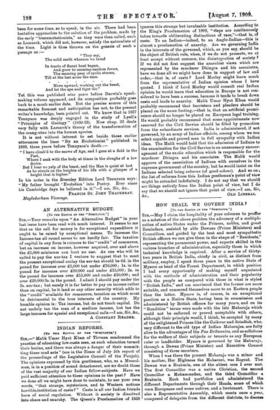INDIAN REFORMS.
fTo 'Mu /EDITOR. OP TICS 'SPIV:MILTON...I Sin,—" Malik Umar Hyat Khan of Tirvana condemned the practice of educating low-caste men, as such education turned their brains, and there was always a danger of their commit- ting these mad acts" (see in the Times of July 5th report of the proceedings of the Legislative Council of the Punjab). The opinions expressed by this gentleman, who, as a Mussul- man, is in a position of sound detachment, are no doubt those of the vast majority of our Indian fellow-subjects. Have we paid sufficient attention to these opinions in the past ? Have we done all we might have done to maintain, to use your own words, " that strange, mysterious, and to Western notions horrible,institution of caste?" Caste is all our Indian friends have of social regulation. Without it society is dissolved into chaos and anarchy. The Queen's Proclamation of 1858 ignores this strange but invaluable institution. According to the King's Proclamation of 1908, " steps are continuota4 taken towards obliterating distinctions of race,"—that is, of caste. To an Indian—indeed, to an Anglo-Indian—this is almost a proclamation of anarchy. Are we governing India in the interests of the governed, which, as you say, should be the object of British rule, when, if we do not promote, we at least accept without concern, the disintegration of society F If we did not first suggest the anarchist views which are represented by the murderer Dhingra and his associates, have we done all we might have done in support of law and order,—that is, of caste ? Lord Morley might learn much from the representative of Indian opinion whom I have quoted. I think if Lord Morley would consult real Indian opinion be would learn that education in Europe is not con'. sidered to have been a success, because it tends to break down caste and leads to anarchy. Malik Umar Hyat Khan would probably recommend that barristers and pleaders should be placed on the same footing,—that is, that an artificial promi;. nence should no longer be placed on European legal training. He would probably recommend that some appointments now reserved for the Civil Service should be filled by promotion from the subordinate services. India is administered, if not governed, by an army of Indian officials, among whom we ban select capable and proved men in full sympathy with Indian ideas. The Malik would hold that the admission of Indians to the examination for the Civil Service is an unnecessary encour- agement of the exotic education which is responsible for the murderer Dhingra and his associates. The Malik would approve of the association of Indians with ourselves in the supreme government of the country, but he would insist on the Indians selected being subarna (of good colour). And so on ; the list of reforms from this Indian gentleman's point of view might be extended indefinitely. I do not say that we should see things entirely from the Indiasi point of view, but I dO say that we should not ignore that point of view.—I am, Sir,






































 Previous page
Previous page